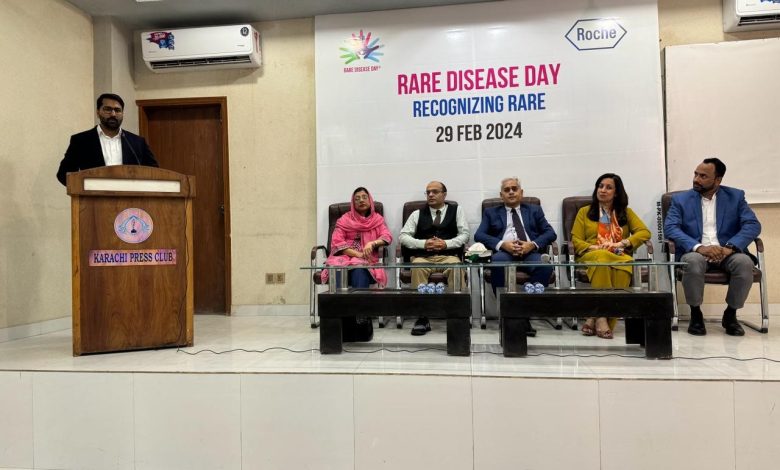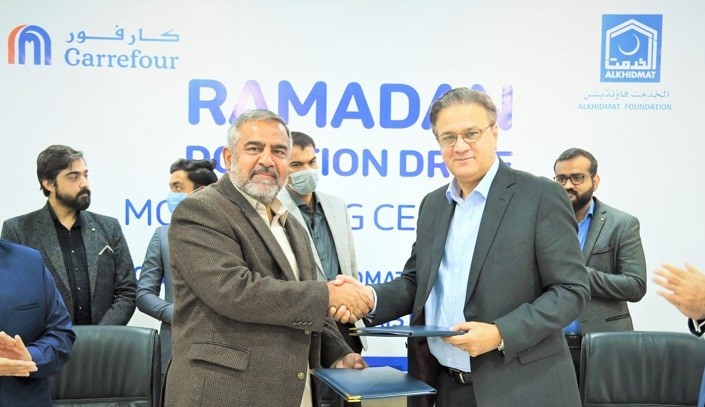Roche Pakistan celebrates Rare Disease Day

Speakers highlight government intervention as vital support for rare disease patients during press briefing and panel discussion at Karachi Press Club
In recognition of Rare Disease Day, Roche Pakistan Limited held a panel discussion and press briefing to raise awareness about rare diseases in Pakistan, and to emphasize the unmet needs of patients especially for awareness, funding and government support. The panel comprised MD Roche Pakistan, Ms. Hafsa Shamsie, Roche’s Head of Medical, Dr. Yasir Adnan. In addition, paeds neurologist Dr. Raman Kumar and hematologist Dr. Munira Borhany and Dr. Saqib, Director Health Services, Health Department, Govt. of Sindh were also there.
Ms. Hafsa Shamsie, MD Roche highlighted the fact that even for those who have been diagnosed, the lack of government healthcare spends and support makes the treatment burden for rare diseases even more difficult to bear. Rare diseases sufferers are the neglected outliers in Pakistan’s healthcare system.
Roche is a company that is committed to serving rare disease patients by bringing innovative treatments that can help patients live a fully normal life or at least a much better quality of life. But, treatment is one side of the picture. Ensuring that patients have awareness about rare diseases, and access to these standard of care treatments is the other side of the picture.
Shamsi shared that since 2017, Roche has run a Patient Support Program that has helped almost 25,000 patients with free of cost treatment for a number of diseases including Spinal Muscular Atrophy and Multiple Sclerosis. But as the burden of disease grows no one company or entity can go it alone. That is why it is critical to have the government on board through public private partnerships.
This will help to support rare disease patients by including funding for standard of care treatments into government healthcare programs. She said rare disease patients deserve the same care, attention and inclusion as other patients and that is why it is time that “Recognizing Rare” becomes a healthcare priority too.
Dr. Yasir Adnan explained that worldwide about 300 million people live with a rare disease. Moreover, with Pakistan having over 240 million people, the rare disease incidence in this country becomes more acute with such a large population. Rare diseases like Multiple Sclerosis, Spinal Muscular Atrophy and Hemophilia pose not only debilitating physical and health challenges for the sufferer, but also grave challenges for the families of sufferers and for the society at large.
Without treatment, children are deprived of the chance for a normal life such as in the case of hemophilia, young women lose out on their most productive years as in the case of multiple sclerosis, and even SMA patients who could perhaps regain function are unable to do so. One of the other problems is that rare diseases can sometimes be invisible to others and it can take years sometimes for someone to even get a diagnosis. And worse still, these people are often lost within a healthcare system that fails to give them answers.
He stated that worldwide, less than 10% of patients with rare diseases are treated. So the numbers of rare disease sufferers coming through the system is already an under representation – especially in a country with poverty and low literacy.
He talked about Multiple sclerosis (MS) – a condition that can affect the brain and spinal cord, causing a wide range of potential symptoms, including problems with vision, arm or leg movement, sensation or balance. It’s a lifelong condition that can sometimes cause serious disability. It’s most commonly diagnosed in people in their 20s, 30s and 40s although it can develop at any age. It’s about 2 to 3 times more common in women than men. MS is a disabling and stigmatizing disease that can lead to social isolation and exclusion.
It is important that governments, national healthcare systems, employers and legislation enable people with MS to achieve a quality of life. This includes diagnosing and treating the disease early to stave off relapses, and prevent progression of disability, alongside protective legislation to enable people to access affordable treatment as well as remain in employment.
Dr. Raman Kumar said spinal muscular atrophy (SMA) is a severe neuromuscular disease and one of the leading genetic causes of infant death. He said that even though there was a lack of data to assess the prevalence of SMA in Pakistan, cousin marriages are the most common reason attributed for its occurrence and Pakistan had a very high frequency of cousin marriages.
Dr. Kumar suggested that Govt/policymakers should work in establishing National/Provincial Policy for Rare Disease and capacity building of healthcare infrastructure to serve rare disease patients. Further, he encouraged all relevant stakeholders for empowering people living with SMA for equitable access to diagnosis, treatment care and social opportunities.
Dr. Munira Borhany explained that Hemophilia A is a debilitating and life-threatening bleeding disorder. Hemophilia A severely affects the quality of life of patients who may experience spontaneous bleeding and bleeding due to trauma within the muscles, joints, and other internal organs, often 15-20 times a year. These bleeding episodes may either end up to be fatal, or result in permanent joint disability.
Hemophilia A, patients experience long-term psychosocial impacts as well. Children face barriers to socialization (missed school, unable to play with friends), leading to impact on education and career decisions. Later in life, they face workplace issues (missed days at work), and have to constantly rely on carers to manage bleeds.
Borhany emphasized that in Pakistan there was a severe lack of hemophilia management infrastructure and was not generally treated in tertiary care hospitals. In addition, hemophilia standard-of-care treatment was generally not covered under any government health program. As a result, patients were forced to use conventional treatments, which hindered their chances to live normal lives. She added there is a dire need for our provincial governments to provide utmost support, especially in terms of standard-of-care treatment, so that patients could live normal lives and become active members of society.




